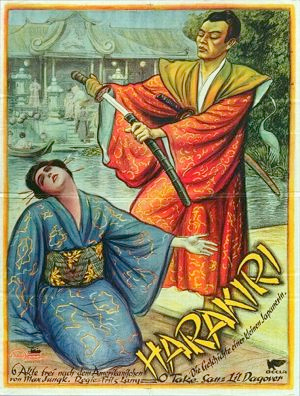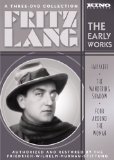| Reviews & Columns |
|
Reviews DVD TV on DVD Blu-ray 4K UHD International DVDs In Theaters Reviews by Studio Video Games Features Collector Series DVDs Easter Egg Database Interviews DVD Talk Radio Feature Articles Columns Anime Talk DVD Savant Horror DVDs The M.O.D. Squad Art House HD Talk Silent DVD
|
DVD Talk Forum |
|
|
| Resources |
|
DVD Price Search Customer Service #'s RCE Info Links |
|
Columns
|
|
|
Fritz Lang: The Early Works
Kino Classics' three DVD set Fritz Lang: The Early Works collects some of the earliest, rarest efforts from the director of such provocative classics as Metropolis (1926), M (1931) and Fury (1936). Probably the most surprising thing about the trio of restored 1919-21 German silents assembled here is that they have very little of the austere, carefully composed visual style that Lang would later be well-known for. Truth be told, they fall along the lines of typical early silent cinema - melodramatic, stodgy, plain, sentimental. Yes, they are more slickly produced than their American counterparts (there's none of the obvious outdoor-for-indoor stagings found in most Hollywood productions of the era) but still marked by their overwhelming quaintness. For fans of Lang's work, however, the set is worth a look for the occasional glimpses of the virtuosity that was to come.
Fritz Lang: The Early Works consists of the following three films:
Harakiri (1919; 87 minutes)
In this visually resplendent, pastoral retelling of the Madame Butterfly saga, a Japanese maiden named O-Take-San (Lil Dagover) falls in love with a visiting military officer, Olaf Anderson (Niels Prien). After they marry and Olaf leaves for Europe, O-Take-San has a baby. She holds out hope that he will eventually return, even while being romantically pursued by a Prince (Meinhart Maur) and facing unrelenting pressure from a Buddhist monk (Georg John) to give up her child to be raised by a two-parent family. Four years later, Olaf does return to Japan - with his European wife.
The audacious faux-Orientalism and sheer melodrama throughout Harakiri must have served as cinematic comfort food to a German public still adjusting to life after World War I (similar to what Fritz Lang himself was going through). The filmmakers certainly pulled out all the stops to make this Berlin-shot opus look as Japanese as possible, but the final effect winds up being a busy, antique-store vision of Japan. Leaden-paced, adequately acted and hobbled by a European cast that never convincingly appears Asian, Harakiri exists mostly as a curiosity. Lang's direction is pretty stodgy overall, but there are a few stylized, thoughtfully done shots which seem to indicate that he was attempting to capture some of the visual simplicity of Japanese print artists like Hiroshige. Amidst all the frou-frou goings-on in the rest of the picture, that was quite a feat.

The Wandering Shadow (Das wandernde Bild) (1920, 67 minutes)
The tangled story that unfolds in the torrid melodrama The Wandering Shadow centers around the character of Irmgard (played by actress Mia May), a virtuous woman who, like many such heroines past and present, gets involved with the wrong kind of man. As the film opens, she is seen fussing on a train headed for the picturesque mountains of Germany, fleeing an unidentified gentleman. Through flashbacks, we learn that Irmgard once found employment with a wealthy free-love advocate (Hans Marr). The two have an affair and, with Irmgard pregnant and desperate, she schemes to secretly marry the man's brother (also played by Hans Marr) so it at least appears that the child is being raised properly. The confusing story eventually has Irmgard trudging through the mountainous terrain to come across a generous monk who offers her a chance at the redemption she so desperately desires.
Something of a godmother to the robust, quintessentially German mountain-climbing adventures that Leni Riefenstahl would star in a decade later, The Wandering Shadow counts as another draggy melodrama - although one that isn't without its own campy appeal. Lang's direction is so subtle, however, that one would never suspect that a future cinematic genius was responsible for it. The film as presented in this set is a 67-minute version assembled from surviving elements; its choppy pacing certainly doesn't help the story be any more comprehensible (once it was over, I actually needed to have my spouse explain it to me - and much of it still didn't make sense). Confusing and terribly dated as it is, the film does boast some nice, natural photography of a quaint village and mountainside vistas.
Four Around The Woman (Vier um die Frau) (1921; 84 minutes)
With the intriguing, multi-layered drama Four Around The Woman, one finally begins to see an identifiably Fritz Lang style coming into view. The story here concentrates on Mr. Yquem (Ludwig Harteau), a wealthy merchant with a beautiful, virtuous wife named Florence (Carola Toelle). By chance, Yquem sees a man that he believes once had an affair with Florence and follows him to a hotel. The man in question, William Krafft (Anton Edthofer), is secretly persuaded by Yquem to meet up with Florence so the jealous husband could spy on them. However, Yquem doesn't realize that the man he's tailing is actually the twin brother of his wife's ex-lover. William's brother, Werner (also played by Edthofer) is a cunning jewel thief who is out to fleece Florence's vampy best friend, Margo (Lisa von Marten). While all this is transpiring, a shady gentleman comes to call on Florence, threatening to expose the shameful secret of what happened on the day she got engaged to Mr. Yquem.
Like The Wandering Shadow, Four Around The Woman's scandal-ridden storyline came as the results of another collaborative screenplay that Lang wrote with his second wife, Thea von Harbou (both, coincidentally, have plots involving lookalike brothers). Plot-wise, the film is still somewhat routine and melodramatic, but Lang's more assured directing and the sophisticated, lavishly appointed production puts this one at a distinct step above the other films in the set. Although Four Around The Woman's quaint, soapy theatrics are a far cry from the fantastic visuals and complex issues explored in Metropolis only a few years later, it's an enjoyable flick that amply demonstrates Lang's talents.
The DVDs:
Video:
The films on Fritz Lang: The Early Works were mastered from 35mm prints restored by Germany's Friedrich Wilheim Murnau Stiftung Foundation, with period-appropriate tinting and missing segments reconstructed through surviving script excerpts or publicity material. While the prints used have the usual scratches, artifacts, and wear associated with silent era films, they are nicely mastered (each film gets its own disc) with few obvious defects other than some examples of missing bits of film resulting in choppy flow.
Audio:
All three films are furnished with whimsical, often intrusive and (especially on Four Around The Woman) repetitive original scores played by a small ensemble. These are composed by Aljoscha Zimmermann and they are pleasantly mixed in stereo for the DVD edition.
Extras:
None. Kino's packaging is nicely designed if misleading (these films are not in the Metropolis style), and the brief descriptions provided on the back of the case left me yearning for more background info on these films. Historical info on the Decla studio, Fritz Lang's life at this time, or bios of the actors (nearly all of whom are unknown) would have been helpful.
Final Thoughts:
Kino Classics' Fritz Lang: The Early Works brings a few of the renowned director's neglected silents into wide circulation, which is a cause for celebration in itself. The films, however, are at best historical curios. Overall, the set pales in comparison with recent, more comprehensively done projects like Criterion's Lonesome and Edition Filmmuseum's Four Films with Asta Nielsen. It's worth a peek for those curious to see what Lang's artistically unsure, often plodding earliest work was like. Rent It.
Matt Hinrichs is a designer, artist, film critic and jack-of-all-trades in Phoenix, Arizona. Since 2000, he has been blogging at Scrubbles.net. 4 Color Cowboy is his repository of Western-kitsch imagery, while other films he's experienced are logged at Letterboxd. He also welcomes friends on Twitter @4colorcowboy.
|
| Popular Reviews |
| Sponsored Links |
|
|
| Sponsored Links |
|
|
| Release List | Reviews | Shop | Newsletter | Forum | DVD Giveaways | Blu-Ray | Advertise |
|
Copyright 2024 DVDTalk.com All Rights Reserved. Legal Info, Privacy Policy, Terms of Use,
Manage Preferences,
Your Privacy Choices | |||||||














